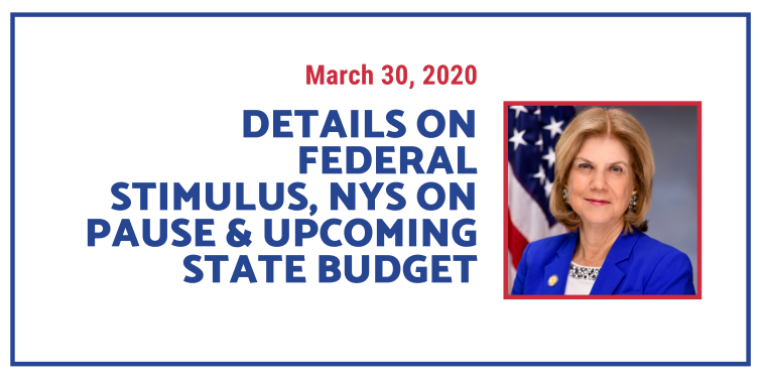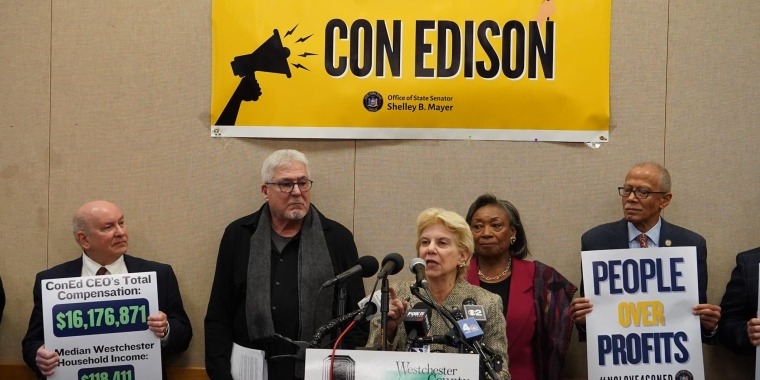
Details on Federal Stimulus, NYS on PAUSE & Upcoming State Budget
March 30, 2020

Dear Friends,
As of today, Monday, March 30th, New York State has lost 1,218 individuals due to the coronavirus, and 19 of those individuals were Westchester residents. My deepest condolences go to the families and friends of those we have lost. I know we are all working hard to minimize the spread of the virus and keep each other safe, and I thank you for the sacrifices you are making to that end.
We are particularly indebted to the healthcare workers and first responders on the frontlines of this crisis. Please know, elected leaders at all levels of government and members of the community are working to ensure you have the supplies you need and deserve.
My colleagues and I are in Albany working toward an on-time state budget due by April 1st. The state is facing a significant fiscal shortfall, upwards of $10 billion, due to the economic effects of the coronavirus. As the Chair of the Senate Education Committee, my top priority is to protect education funding from cuts in the state budget. I have proposed the Coronavirus Aid Relief for Education (CARE) Act to provide a temporary tax rate increase on ultra-millionaires earning over $5 million to help avoid education cuts and add over $2.5 billion to the state's coffers. Read more about this proposal in the section below.
Throughout all levels of government, your representatives are working hard to provide support for healthcare workers, first responders, laid off workers, and businesses small & large.
On Friday, March 27th, Congress approved and the President signed the Coronavirus Aid, Relief, and Economic Security (CARES) Act. The stimulus bill supplements state unemployment benefits, provides relief for small businesses, and sends a one-time direct cash payment to working Americans, among many other measures. Additional details about the CARES Act are included in the section below.
Governor Andrew Cuomo has extended the NYS on PAUSE Executive Order until April 15th, continuing the mandate that all non-essential employees work from home. Please do everything you can to minimize your physical contact with others during this time. Public health experts advise that you should only be leaving your house for necessary trips to the grocery store or pharmacy.
My next newsletter will provide more details about the final 2020-2021 NYS Budget.
Wishing you and your loved ones good health in the coming week.
Kind regards,
Shelley B. Mayer
Senator Mayer Proposal for a CARE Act ("Coronavirus Aid Relief for Education" Act)
At the start of the 2020 Legislative Session in January, few anticipated the challenges that would confront us as we work toward a final 2020-2021 NYS Budget.
In light of the terrible impact of the virus on our state budget, I am now proposing that this year’s budget include a short-term tax increase on New Yorkers earning over $5 million annually. This CARE proposal is designed solely to provide for lost revenue associated with the economic effects of the coronavirus, particularly to provide funding for education. I am proposing a temporary tax rate increase on those New Yorkers who, even in this difficult economic climate, still have taxable income above $5 million annually. This proposal raises the top tax rate from 8.82% to at least 10.90% on individuals and couples with taxable income of $5 million or more. Even combined with NYC’s highest local income tax rate (3.876%), this rate remains competitive with California’s highest income tax rate of 13.3%. The rate increase will affect fewer than 8,000 households statewide and is expected to generate approximately $2.5 billion dollars annually.
During this difficult time, we have asked our schools to step-up in unprecedented ways. Our teachers transformed their curriculum to "distance learning," schools were asked to serve as childcare providers, and districts were also tasked with ensuring children are fed while schools are closed. Our teachers and administrators stepped up with enthusiasm and creativity to meet these new challenges. I believe that we cannot allow our children's education and our economic future to suffer as a result of the economic setbacks of this pandemic. We can avoid having to cut teachers, social workers, mental health professionals, and other resources our students need by adopting the CARE Act in this year's budget.
Federal Stimulus Bill: Congress Adopts Major Economic Assistance for New York through the CARES Act
Among the most important provisions in the federal CARES Act are the following:
Supplemental Unemployment Insurance Benefits for New Yorkers
- Full Paycheck Replacement: An additional $600 increase for every New Yorker, which equates to 100 percent of wages for the average New Yorker without a paycheck struggling through the crisis, added onto your unemployment benefit. (In New York, the maximum unemployment insurance benefit is $435 per week, meaning that New Yorkers claiming unemployment would now be eligible for up to $1,035 weekly.)
- Extension of Benefits: Both new applicants and those who are already receiving unemployment benefits are eligible for an additional 13 weeks of federally-funded unemployment insurance benefits in addition to the 26 weeks that the state already provides.
- Expanding Access for part-time, self-employed, gig economy workers and independent contractors to unemployment insurance benefits. Those who were laid off from their job before they actually started working are also eligible, as well as those who didn't otherwise have a long enough work history to qualify or cannot work due to loss of childcare. Those who quit their jobs without cause are still not eligible for unemployment insurance benefits.
- To file for unemployment, visit ny.gov/services/get-unemployment-assistance. Please email me at smayer@nysenate.gov if you are having persistent issues filing your claim.
$15.5 Billion in Direct Payments to Working New Yorkers
- $1,200 cash payment to every working New Yorker with a Social Security number.
- An additional $500 cash payment is available per child.
- The full payment is available for individuals making up to $75,000 (individual) and $150,000 (married).
- The value begins decreasing and then phases out completely for those making $99,000 for single taxpayers or $198,000 for joint taxpayers without children.
- The rebates will be paid out as advance refunds (in the form of checks or direct deposit) on the basis of taxpayers’ filed tax year 2019 returns (or tax year 2018, if a 2019 return has not yet been filed).
Small Business & Nonprofit Rescue Plan
- $350 billion in loan forgiveness grants to small businesses and nonprofits to maintain existing workforce and help pay for other expenses like rent, mortgage, and utilities. These loans can be totally forgiven under certain circumstances.
- $10 billion for Small Business Administration (SBA) emergency grants of up to $10,000 to provide immediate relief for small business and nonprofit operating costs.
- $17 billion for SBA to cover 6 months of payments for small businesses and nonprofits with existing SBA loans.
- To be eligible, small businesses and nonprofits must have 500 employees or fewer.
- Click here for the Small Business Owners Guide to the CARES Act. This guide applies to nonprofits as well.
Foreclosure Moratorium and Consumer Right to Request Forbearance
- The CARES Act provides relief for homeowners with Federal Housing Administration (FHA), United States Department of Agriculture (USDA), Veterans Administration (VA), or Section 184 or 184A backed mortgages and those with mortgages backed by Fannie Mae or Freddie Mac from falling behind on payments.
- These borrowers will have the ability to request forbearance on their payments for up to 6 months, with a possible extension for another 6 months without fees, penalties, or extra interest.
- These borrowers who are facing foreclosure will also have 60-day relief from foreclosure or being forced to relocate as we address the COVID-19 pandemic.
- You must contact your mortgage servicer to see if you are eligible and to seek forbearance if you are having difficulty making your mortgage payments at this time.
Temporary Moratorium on Eviction Filings
- Section 4024 of the CARES Act prevents a property owner who receives a federal subsidy or has a federally backed mortgage loan from filing for eviction against or charging penalties or fees to a tenant who cannot pay rent for a period of 120 days after enactment of the CARES Act.
- The provision also prohibits a property owner from issuing a notice to vacate a property to a tenant for an additional 30 days after the moratorium. This protection covers properties that receive federal subsidies such as public housing, Section 8 assistance, USDA rural housing programs, and Low Income Housing Tax Credits, as well as properties that have a mortgage issued or guaranteed by a federal agency (including FHA and USDA) or Fannie Mae or Freddie Mac.
Emergency Response Appropriations
- $100 million for Personal Protective Equipment (PPE) for first responders.
- Billions slated directly for New York hospitals out of $100 billion nationally for equipment, supplies, staffing, and construction.
- $37.3 million for New York State & New York City out of $750 million in CDC Public Health Emergency Preparedness funding to assist health agencies with strategic planning and strengthen public health preparedness capabilities.
- $45 million for New York of the $850 million for Byrne-Justice Assistance Grants to support state and local police departments to purchase PPE and medical items, support overtime for officers and meet other local needs. Based on FY2019 formula awards, estimates include:
- $27 million for New York State,
- $18 million for local governments eligible for Byrne-Justice Assistance Grants.
We are still working on receiving New York State and district specific fund disbursement data. I will share that information with you as soon as we receive it. Please email me with any specific questions you have at smayer@nysenate.gov, and we will reach out to our federal partners to provide clarification.
NEW YORK STATE ON PAUSE
On Sunday, March 29th, Governor Andrew Cuomo extended the NYS on PAUSE Executive Order until April 15th, continuing the mandate for all non-essential employees to continue working from home.
For a list of businesses and nonprofits considered essential, click here . If your entity is not on the list, and you would like to appeal, you can submit a form, available here , to Empire State Development.
In addition, the Governor announced the following :
- School closings have been extended until April 15th, unless extended after evaluation, and the 180-day requirement can be met even with this closing, provided vacation and snow days are used first.
- School Board Elections scheduled for May 2020 have been postponed to at least June 1, 2020.
- The April 28th Presidential Primary has been postponed to align with the June 23rd Congressional/State Primary date.
- Both the federal and state income tax filing deadlines have been postponed by 90-days to July 15, 2020. Click here for more details from the Department of Taxation & Finance.
